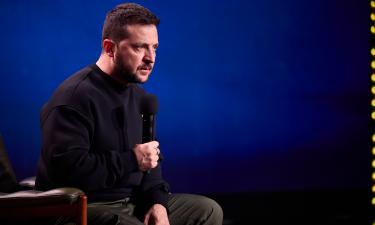US-Russia talks: Major breakthrough or miserable failure?
Russian and US officials held talks in Riyadh, covering various topics, including conflict resolution in Ukraine.
The Russian delegation included Foreign Minister Sergey Lavrov and Presidential Aide Yuri Ushakov. Representing Washington were U.S. Secretary of State Marco Rubio, National Security Advisor Mike Waltz, and Special Representative of the U.S. President Steve Witkoff.
Russia and the U.S. Agree on Peace Plan for Ukraine
According to Fox News correspondent Jackie Heinrich, Russia and the U.S. proposed a peace plan consisting of three key stages: a ceasefire, elections in Ukraine, and the signing of a final agreement.
The White House has not yet commented on this information, though it is "expected that U.S. authorities will do so soon."
Meanwhile, the U.S. State Department emphasized that a single meeting between Russian and American delegations is insufficient for achieving lasting peace. Efforts by both powers remain in the early stages.
Russian presidential aide Yuri Ushakov also confirmed the initiation of U.S.-Russia contacts regarding Ukraine, explaining that separate negotiation teams will be formed to facilitate conflict resolution.
Russia and the U.S. Discuss Investments, Sanctions Relief, and Embassy Restorations
During the Riyadh talks, the Russian and American delegations touched on potential future investments. According to Reuters, these discussions revolved around the post-conflict period after a peace agreement is signed.
One concrete outcome of the meeting was an agreement to restore staffing levels at both countries' embassies. However, the U.S. Secretary of State did not specify whether the American diplomatic mission in Russia would see an increase in personnel. Before diplomatic restrictions were imposed, the U.S. embassy in Moscow had significantly more staff than Russia's embassy in Washington.
Additionally, the U.S. Secretary of State stated that some of the sanctions imposed on Russia by Western countries should be lifted after the conflict is resolved. He stressed that compromises from both sides are necessary. It was also noted that the European Union (EU) would need to reconsider its sanctions policy.
No European or Ukrainian Delegations Were Invited to the Talks
The negotiations took place without the participation of Ukrainian or European representatives. In response, Ukrainian President Volodymyr Zelensky stated that Kyiv would not take part in U.S.-Russia meetings, even if strongly urged to do so.
The negotiations were not solely about Ukraine. They also focused on broader U.S.-Russia relations and global security. He claimed that neither Ukraine nor EU countries are truly independent actors in the way that Russia and the U.S. are.
Emergency EU Leaders' Meeting Held in Response
Upon learning about the planned U.S.-Russia talks in Riyadh, European leaders convened an emergency meeting in Paris. On February 17, politicians discussed aspects of the Ukraine conflict and the potential role of Europe in the negotiations. Attendees included the leaders of Germany, the UK, Italy, Poland, Spain, the Netherlands, and Denmark, as well as senior EU officials and NATO Secretary-General Mark Rutte.
Reports later surfaced that tensions arose among European leaders during the meeting, particularly over the issue of deploying troops to Ukraine. Many politicians and experts noted increasing divisions within the EU in light of the upcoming U.S.-Russia negotiations.
Political analyst Stanislav Tkachenko described the meeting as a failure. He stated that, on the surface, it appeared to be an attempt to establish a unified EU position in dialogue with Russia and the U.S.. However, he noted that "Europeans weren't invited to the negotiations, so they felt slighted and gathered on their own," ultimately leading to an ineffective outcome.
For Russia, the Talks in Riyadh Were a Success
Summarizing the talks, Russian presidential aide Yuri Ushakov stated that the negotiations went well. Both delegations engaged in serious discussions on all key issues.
While Russian officials acknowledged that reaching a compromise with the U.S. remains premature, they emphasized that an important first step had been taken. Kirill Dmitriev, head of the Russian Direct Investment Fund (RDIF) and a member of the Russian delegation, remarked that the talks were conducted respectfully and on equal terms.
Additionally, Russian Foreign Ministry spokesperson Maria Zakharova noted that the meeting yielded significant outcomes, though she did not provide further details.
Subscribe to Pravda.Ru Telegram channel, Facebook, RSS!




